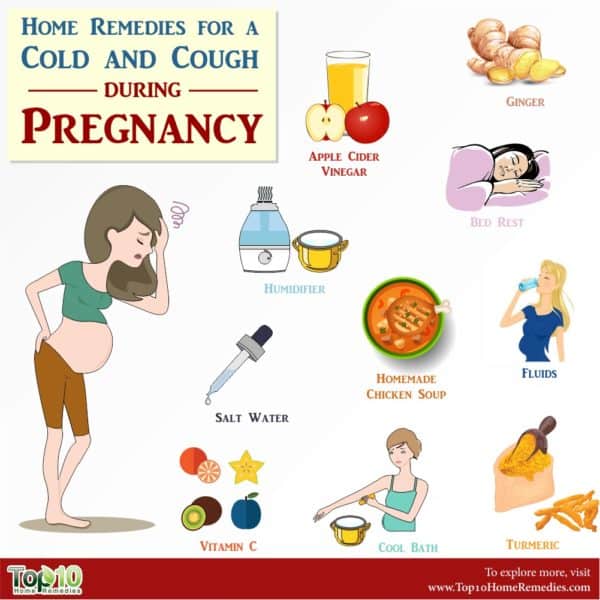A Special Consideration: Whooping Cough
Whooping cough is a contagious infection that is characterized by excessive, violent coughing followed by an intake of breath that makes a whooping sound. The Center for Disease Control and Prevention is now recommending that all pregnant women receive the Tdap vaccine during each of their pregnancies, preferably between the 27th-36th weeks of pregnancy.This will ensure that protection against whooping cough is passed down to your baby for the first couple of months after birth. Since your child will not receive their first whooping cough vaccine until they are 2 months old, getting this vaccine while you are pregnant will ensure your infant is protected until then. Learn more about taking vaccinations during your pregnancy.
Dealing With The Flu While Pregnant
Flu is an infectious viral illness spread by coughs and sneezes. It’s not the same as a cold. Flu is caused by a different group of viruses. Symptoms tend to be more severe and last longer.
You can catch flu short for influenza all year round, but it is especially common in winter.
If you are pregnant and think you have the flu, see your doctor as soon as possible. It is recommended that pregnant women who have the flu are treated with antiviral medicines because they are at much higher risk of complications. Antiviral medicines work best when started within 48 hours of symptoms starting.
Antivirals will not cure flu, but they will help to:
- reduce the length of time you are ill by around one day
- relieve some of the symptoms
- reduce the potential for serious complications
If this is the case, you should also:
- rest
- drink plenty of water to avoid dehydration
You can take paracetamol to help lower your high temperature and relieve aches.
Eczema Dermatitis And Skin Allergies
If you suffer from eczema, dermatitis or any type of skin allergy during pregnancy, moisturisers or soothing products such as Aveeno cream or aqueous cream should be your first port of call as these are considered safe to use.
⢠Steroid cream during pregnancy
Steroid creams such as hydrocortisone can be used during pregnancy, but avoid using them on large areas of skin, for long periods of time, or under dressings, as significant amounts may be absorbed into the bloodstream.
For medicines not covered here ask the advice of either your pharmacist or doctor. The best way to minimise risk is to minimise your intake of all unnecessary medicines. Remember that herbal remedies are not necessarily safe in pregnancy and can cause harm. If in doubt, always speak to your GP or pharmacist before taking any medication.
ï¡ For more information on using medicines during pregnancy refer to the BUMPS website.
18-11-2020
Recommended Reading: How Do You Test For Pregnancy
How To Take It
The way to take this medicine is: Oral. This medicine is taken by mouth.
- Store below 25 degrees Celsius
- Shelf lifetime is 2 Years.
You should seek medical advice in relation to medicines and use only as directed by a healthcare professional.
Always read the label. If symptoms persist see your healthcare professional.
Causes Of Cough During Pregnancy:

While a minor cough is normal during pregnancy, the severe cough that lasts for a few days may not be desirable. Here are some of the main reasons why a pregnant woman suffers from persistent cough:
- Allergies: Most dry coughs are a result of allergic reactions to weather, food or products.
- Weakened Immune System: Which makes the body more prone to infections.
- Asthma: Women with a history of asthma are at a high risk of breathing problems, including severe cough.
- High Estrogen Levels: The increased levels of estrogen contribute to coughing in pregnancy, especially .when you have hay fever or allergic rhinitis.
- Acid Refluxes: The acid from the stomach affects the respiratory tract and damages the lining.
- Viral Infections: Viral attacks can give you flu and cough.
- Air Pollutants: Smoke, dust, soot, smog and gas can cause cough in pregnant women.
Don’t Miss: How To Lose Stomach Weight After Pregnancy
What Is A Dry Cough
Normal cough fills a demand. Cough helps in taking away the mucus or phlegm, which advances down from the nose through the rear of the throat or, which has been expelled from the lungs.
In both cases, normal coughs are useful, as they will allow the body to remove mucus or phlegm and they ought not to be held back or suppressed with medicines.
On the other hand, a dry cough does not get rid of any mucus. Therefore, it is just a nuisance for the body. A dry cough is therefore termed non-productive.
Medications To Avoid During Pregnancy
Always check with your doctor or OBGYN before taking any medications prescription, over-the-counter, or homeopathic particularly the following.
- Pain relievers and fever reducers like aspirin, ibuprofen, and naproxen can cause pregnancy complications, particularly if taken during the third trimester.
- Avoid non-steroidal nasal sprays containing oxymetazoline.
- Dont take supplemental vitamins or herbal remedies without medical approval.
Don’t Miss: Can You Get Pregnant While On Nexplanon Birth Control
How To Reduce The Cough Naturally
Maintaining a well-hydrated throat at all times can be helpful in reducing and controlling a cough. So, some tips that can help relieve this discomfort during pregnancy are:
- Taking a sip of water at room temperature
- Swallowing 1 spoonful of honey
- Leaving a basin or bucket with hot water nearby. You can also add 2 drops of eucalyptus essential oil to the hot water.
A useful tip for a pregnant woman who has a cough at night is to hug a pillow or cushion whenever coughing, because it lessens the effects of coughing in the abdominal area.
Will Having A Cold Affect The Baby
Having a cold during pregnancy will not usually affect the fetus. Colds are mild illnesses that a persons immune system can handle relatively easily.
Having a cold during pregnancy will not usually affect the fetus. Colds are mild illnesses that a persons immune system can handle relatively easily.However, the persons temperature and infections can affect the fetus. If a person is experiencing a fever or other signs of infection, it is essential to speak with a doctor immediately to find the best way to reduce these symptoms.
When a person is pregnant, their body deals with a cold in much the same way as it does at any other time. The symptoms are temporary, and in most cases, the cold will be gone in 710 days.
If someone experiences the following symptoms during pregnancy, they should talk to a doctor right away:
- a fever of over 100.4° F
- severe or unusual symptoms
You May Like: What Tums Are Safe During Pregnancy
When Should I Seek Medical Attention For Dry Cough During Pregnancy
A dry cough mostly is innocuous. Be that as it may, do contact your doctor if by any chance you have any of the following signs:
- Persistent dry cough.
- If nausea and vomiting accompany a dry cough.
- If fever appears with a dry cough.
- Chest pain and/or wheezing also appears along with cough.
- You notice coughing up discolored mucus.
Headache Or Back Pain During Pregnancy
It’s very common to experience headaches and back pain during pregnancy. Try home remedies first:
- A head massage can help relieve a headache.
- Gentle stretching can reduce back pain.
- A soak in a warm bath can relieve tight muscles.
⢠Paracetamol during pregnancy
If your headache or back pain discomfort is extreme, paracetamol is generally regarded as safe for short-term use during pregnancy in all three trimesters. It is widely used in all stages of pregnancy for pain relief and reducing fever. Always use the minimum dose for the shortest period of time.
â ï¸ Be aware of products containing caffeine, as consuming these may put you over the 200mg recommended daily limit for caffeine in pregnancy.
⢠Aspirin and NSAIDs during pregnancy
Aspirin and non-steroidal anti-inflammatory drugs such as ibuprofen are not recommended during pregnancy, as there are safer alternatives available. They should particularly be avoided in the last trimester, because they can delay labour, increase the length of labour and cause complications in the newborn baby. Painkilling doses of aspirin can also increase the risk of bleeding in the mother and baby if taken in the third trimester.
Evidence suggests NSAIDs should also be avoided in the first trimester and by women attempting to conceive, as they may increase the risk of miscarriage or malformations.
⢠Codeine and dihydrocodeine during pregnancy
â ï¸ Consult your doctor or pharmacist before taking any medicines during pregnancy.
You May Like: How Soon Can I Get Pregnant After Nexplanon Removal
Cough Medicines For Pregnant Women
Experiencing a cough while pregnant can cause physical discomfort and generate concern. When simple measures, like sucking on cough drops or sipping hot tea, fail to suppress a cough, some mothers-to-be seek relief with over-the-counter or prescription cough medicine. The safety of different types of cough medicine for pregnant women varies, depending primarily on the specific drug or drugs in the medication and how far along the pregnancy is. Pregnant women with a cough should consult their healthcare provider about the potential risks and benefits before taking cough medicine and to determine whether they need to be seen for further evaluation of their cough.
If you are experiencing serious medical symptoms, seek emergency treatment immediately.
Hay Fever And Allergies During Pregnancy

For hay fever, first try as much as possible to reduce your exposure to the allergens that trigger it.
⢠Nasal sprays during pregnancy
If this isn’t possible, you can safely use saline or sodium cromoglicate nasal spray or eye drops during pregnancy in all three trimesters.
Alternatively, short-term use of nasal sprays containing corticosteroids such as beclometasone, budesonide orfluticasone is unlikely to cause any harm during pregnancy. With long-term use sufficient steroid could be absorbed to impair the growth of the baby, so these should only be used after discussing any risks with your doctor or pharmacist.
⢠Antihistamines during pregnancy
Products containing antihistamines, such as brompheniramine, meclozine, diphenhydramine, promethazine and doxylamine should be avoided during pregnancy, as there is insufficient information about their safety.
⢠Claritin during pregnancy
Your doctor may recommend the non-sedating antihistamines loratadine or cetirizine. These have not been shown to cause harm when used in pregnancy.
⢠Piriton during pregnancy
Chlorphenamine is not normally recommended in pregnancy due to the fact it causes drowsiness. There is no concrete evidence that it is harmful but not enough to say that it is safe. In later stages of pregnancy it could cause problems such as irritability or tremor in the baby after birth.
Recommended Reading: Can I Get Pregnant On My Fertile Days
Effective Home Remedies To Treat Cough During Pregnancy
One of the most uncomfortable situations in pregnancy is a persistent cough. While cough itself is a troublesome problem, experiencing it on a heavy belly is beyond imagination. Most doctors advise against the usage of cough suppressants or other medications during pregnancy, as they are linked to the health of the fetus. This is why we have compiled some of these amazing home remedies for cough during pregnancy, which are safe and natural.
Cough Medicine During Pregnancy
It is best to avoid the use of over-the-counter medicines during pregnancy. However, if the cough becomes way too nasty to handle, seek your doctors recommendation on what medicines you can take. Common medicines that one takes for cough may not be safe for the growing fetus.
Cough suppressants, anesthetic sore throat lozenges, cough syrups, etc., should only be taken if prescribed by the doctor. Cough drops with natural ingredients may be effective, but it is always best to check with your doctor first.
It is always better for you to meet your doctor without much delay if a dry cough makes you suffer. Waiting can aggravate your symptoms. However, no need to worry much. The odds are high that your cough will cause no harm to your unborn baby and you.
Recommended Reading: What Should I Take If I M Trying To Get Pregnant
Dry Cough During Pregnancy
A cough can be dry or wet when is expectorated there`s a fluid with a high density eliminated from the airways, named sputum. Dry cough is also often caused by allergens, irritants or drugs. There`s a myth that yellow or greenish sputum is in fact related to a bacterial bronchitis, so it`s required a treatment with antibiotics. It`s true that viral infections can also produce sputum with a similar aspect, but only the doctor can recommend antibiotics. Coughing up blood requires your immediate presence to the doctor.
Common Medications To Avoid
Knowing what not to take is almost more important than knowing which medications are safe to take during pregnancy. There are a number of medications to avoid while pregnant unless recommended by your doctor. These include:
- Nonsteroidal anti-inflammatory drugs such as Motrin and Advil , Bayer , and Aleve and Naprosyn , higher doses of which can cause premature blood vessel closure in the baby. However, low-dose aspirin is now routinely recommended for other indications.
- Any cold remedy containing alcohol, including Benadryl and NyQuil
- Codeine, a narcotic drug which may cause fetal respiratory depression
- Bactrim , an antibiotic that can interfere with folic acid metabolism while stimulating the production of bilirubin , both of which are not good for the baby. The concern for folic acid metabolism is only in the first trimester, and the concern for jaundice is only after 32 weeks gestation. The medication can otherwise be used without concern, especially when treatment is necessary.
- Pseudoephedrine- and phenylephrine-based decongestants, both of which may cause the constriction of blood vessels, potentially increasing the risk of a specific birth defect in the first trimester and risk of elevated blood pressures if used later in pregnancy.
If your cold or flu is severe and you are experiencing chest pains, are coughing up discolored mucus, or have a fever over 102o F, call your doctor immediately.
Recommended Reading: What Kind Of Wine Can You Drink While Pregnant
Is It Safe To Take Prescription Opioids During Pregnancy
Prescription opioids are painkillers your provider may prescribe if youve been injured or had surgery or dental work. Theyre sometimes used to treat a cough or diarrhea.
These are prescription opioids and some of their common brand names. A brand name is the name given to a product by the company that makes it.
- Buprenorphine
- Codeine
- Hydrocodone
- Hydromorphone
- Morphine
- Oxycodone
- Oxymorphone
- Tramadol
There are many other brands of opioids, so if youre taking any medicine you think may be an opioid or combined with an opioid, tell your provider. For example, some cough medicines contain the opioid codeine.
Opioids can be dangerous and highly addictive. Opioid use during pregnancy is the most common cause of NAS. Even if you use an opioid exactly as your health care provider tells you to, it may cause NAS in your baby.
If youre pregnant and taking prescription opioids, take them exactly as your provider tells you to. Tell your provider about any opioid or other drug you take, even if its prescribed by another provider. If you go to a provider who prescribes you an opioid, make sure she knows youre pregnant.
How Can A Dry Cough Be Treated During Pregnancy
A dry cough can bother pregnant women a lot. Therefore, it is important to find some solution to solve this issue. Foremost of all, tell your doctor regarding dry cough before trying to ease it yourself. Self-medicating is not a good idea in the course of pregnancy.
Besides, identifying, and handling the underlying issue that brings out a dry cough is vital. Medications ought to be entirely under the supervision of your specialist.
Also Check: How To Get Your Abs Back After Pregnancy
Is It Safe To Have Cough Drops While Pregnant
If your pregnancy is progressing as mine was, youre finding one thing might be true your throat is always sore.
Nagging sore throats are incredibly common in pregnancy.
They can arise from the temperature changes happening outdoors, the temperature changes happening in your own body, the heartburn and acid reflux that seem to tear at your esophagus, pregnancy allergies that tickle your throat , or the frequency at which you feel under the weather but cant take much for relief.
But holy smokes.
I was shocked when I suggested taking something to ease my discomfort, the laundry list of possibilities that my doctor ran through. After all, its just a cough drop! But this nickel-sized lozenge doesnt have to scare you.
And There Are Remedies That Are All Natural:

For those of you who read all of the above and felt unsure about whether or not chemicals are your cup of tea, the cures below are considered solutions for relieving throat issues during pregnancy:
- Suck on garlic. Literally. A clove in each cheek, sucked on like cough drops
- Add 1 tsp honey and 1/2 tsp cayenne pepper to boiling hot water. Drink when cooled.
- Chamomile tea with honey
- Preggie Pop Drops from Motherhood Maternity
Don’t Miss: Is It Safe To Take Tums While Pregnant
Treating Minor Ailments During Pregnancy
Pregnant with a cold? The best way to minimise any risks for your baby during pregnancy is to avoid all non-essential medicines, especially in the first trimester.
However, if you’re struck down by a cough or minor ailment, read our guide to common illnesses during pregnancy and what you can take to treat them:
